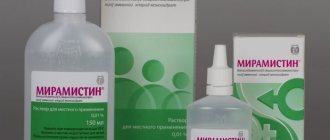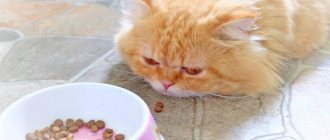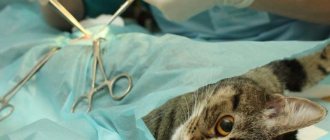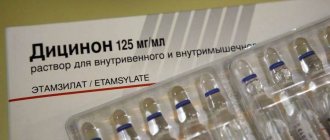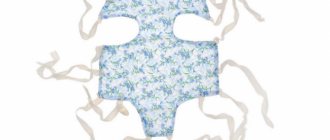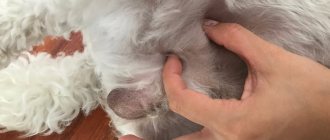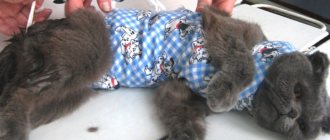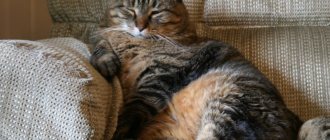Castration of pets is one of the most popular manipulations in veterinary practice, relieving the pet of sexual desire. As a result, the cat’s behavior becomes calmer, the animal does not show aggression and lives 1.5-2 years longer than unsterilized cats. You will no longer have to deal with the unpleasant smell in the house, listen to heartbreaking howls at night and feed your pet so-called harmless hormonal drugs, which often cause the development of oncology and other life-related disorders.
What is cat castration
Castration of cats can be medical or surgical. The result of manipulation is temporary or complete suppression of libido and elimination of the sexual instinct. The most popular is surgery, which is performed under general anesthesia. During the operation, the surgeon removes the testicles (testes) located in the scrotum or, in cryptorchidism, outside it.
The following types of anesthesia are used:
- inhalation;
- local;
- non-inhalation;
- combined method.
The choice of anesthesia depends on the health of the animal and the specifics of the surgical protocol. The optimal age for surgery and painless rehabilitation is from 7 to 9 months.
Medical or chemical castration allows you to do without surgery and anesthesia. During an alternative procedure, an implant with an active substance is implanted under the pet’s skin, which inhibits the production of androgens, changes hormonal levels and behavior. The effect lasts quite a long time - from 6 months to 3 years, there is no need to care for the installation site, no rehabilitation is required. The peculiarity of the procedure is that at any time, if necessary and plans change, the implant can be evacuated, after which the hormonal levels will be restored and the animal will again be ready for mating. Among the disadvantages, one should note the high cost and the presence of a reverse effect during the first 2-4 weeks after installation.
After the operation and the postoperative period, the neutered animal stops marking furniture, which makes it easier to care for and becomes more friendly towards people and other household inhabitants. Owners note an improvement in the furry cat’s psychological state and behavior, and the likelihood of getting injured in street fights over the cat with other males is minimized. Changes in hormonal levels after castration affect the formation of character - street life ceases to be attractive to the cat, so you do not have to close the windows for fear of escape.
Should a cat be spayed: indications for surgery
The behavior of an unsterilized domestic cat during the period of heat can be quite aggressive, accompanied by restless meowing, loud screaming, and the pet’s desire to escape from the house. The consequences of this may be mating with street animals, unwanted offspring for owners, infectious diseases, injuries, etc.
Sterilization will help to avoid these troubles - during this operation, the cat's fallopian tubes are tied. The main risk during sterilization is anesthesia, so the operation should be performed in a good veterinary clinic with experienced specialists.
Indications for cat sterilization:
- preventing unwanted pregnancy and unwanted behavior associated with estrus;
- prevention of the development of pathologies (tumors of the mammary glands and uterus);
- purulent inflammation of the uterus;
- tumor of the ovaries or uterus.
How is castration performed?
Cat owners most often opt for the classic castration procedure due to its simplicity, affordable cost, short postoperative period and low likelihood of complications. Preparation for surgery involves choosing a clinic, weighing and examining the pet (the list of necessary measures and their features is determined by the doctor individually), and determining medical contraindications. You cannot feed your fluffy 12 hours before the scheduled time of surgery, and you should refuse water 2-3 hours before the procedure.
There are two options for castration:
- doping of the testicular cord with a surgical thread - the surgeon ties the cord with suture material, which does not need to be maintained;
- without the use of a ligature - the spermatic cord in this case is formed into a biological unit, patient care is identical.
After applying anesthesia, the doctor must prepare the surgical field, freeing it from hair, and treat the scrotum and the adjacent area with an antiseptic solution. Next, dissection is performed with a scalpel. The spermatic cords are clamped, and the testes are excised and removed. Considering that the intervention area is small, sutures are not always advisable, and therefore there is no need to care for them. The incision site is treated with an antiseptic; complete healing usually occurs after 7-10 days, subject to the prevention of complications and proper care. At the end of the surgical procedure, the cat remains in the clinic under the supervision of staff who will care for him until he is finally recovered from the state of anesthesia. Typically this period is about an hour or more, subject to the presence of negative effects of anesthesia and other features.
Treatment of the surgical wound
During the first two weeks, the surgical area must be inspected regularly and checked to avoid bleeding or infection of the wound.
During the first week, to speed up the healing of the stitches, they should be treated with hydrogen peroxide twice a day and smeared with a solution of brilliant green. Later you can use iodine. In case of the slightest redness, you can lubricate the surgical area with Levomekol.
To prevent the cat from injuring the operating area, it is better to put a special collar on him for the first days. Otherwise, as a result of licking, the seams may come apart.
It is better to do the operation in winter or autumn. During this period, the likelihood of wound infection is less. During the summer, your veterinarian will usually prescribe a course of antibiotics for at least five days.
Rules and important care notes for owners
Full recovery and rehabilitation of a pet after surgery requires patience on the part of the owners. Do not force feed or scold the fluffy if he does not have time to reach the tray or relieves himself in the wrong place. Don’t forget that your pet has experienced extreme stress and may experience pain, so surround him with affection and care and let him know that you are nearby and ready to care for him. You should not bathe the animal for a month after surgery - cleaning should be postponed until the postoperative wound has completely healed. You need to care for the wound using wet wipes or cotton pads soaked in water.
Proper care should be provided and the cat’s health should be closely monitored after castration. The following points should alert the owner:
- Even a slight increase in body temperature in the postoperative period should be a reason to contact a veterinarian. A change in temperature may indicate the addition of an infectious process;
- Refusal to eat for more than 24 hours, increasing weakness, lethargy and apathetic behavior - the development of such symptoms jeopardizes the rapid rehabilitation of the animal and requires consultation with your doctor;
- Changes in the appearance of the wound - if you properly care for the wound, the incision site should be dry (except for the first day) without signs of suppuration. If, after 24 hours after castration, bleeding and exudate are observed, you should play it safe and show the cat to a specialist for an examination and organization of competent care;
- Periodically palpate the cat’s abdomen - if during palpation the abdomen is tense and the pet experiences pain, you should suspect the development of complications and seek veterinary help to prevent complications;
- You should also contact a veterinarian if abnormalities in the cardiorespiratory system develop. The development of shortness of breath and rapid heartbeat are serious symptoms that require emergency care, and such a patient must be cared for in a hospital.
To avoid the development of complications and other health problems for your cat, you should follow your doctor’s recommendations during rehabilitation. High-quality care and care will allow the cat to quickly forget about the stress he suffered and recover after castration as soon as possible.
General information
First we need to explain what castration is. Again, almost all breeders firmly believe that this is surgical removal of the testes. But it is not so. Yes, in most cases, veterinarians prefer to resort to surgical intervention. It is relatively simple, quick (under local anesthesia), and economically feasible.
But in fact, castration is divided into several types:
- Surgical. It can be open and closed (bloody and bloodless).
- Chemical. It is carried out by introducing special substances into the testes that promote the “drying out” of the gonads.
- Radiation. As you can easily guess from the name, it is carried out by irradiating organs with a directed beam of gamma radiation. Since the testes contain a lot of epithelial tissue, which is very sensitive to radiation, they instantly “break down”.
- Medication. A promising type of castration is carried out by surgically implanting special implants under the skin of the animal. Their cartridges gradually release special substances that help block the reproductive function of the animal.
All methods have their pros and cons. Some of the procedures can be performed at home, while others can only be performed in a clinic by a professional veterinarian. In short, there are a lot of nuances.
The features of caring for the animal in the postoperative period also depend on them. In some cases, the recovery period is long, but in others it takes a few days at most. Let's consider this issue in more detail.
Other predisposing factors
However, not every situation is actually to blame for the “cat-lizun”. It happens that wound infections in operated animals developed as a result of poor postoperative care (or its complete absence). For some reason, many owners completely forget that even the banal cleanliness of the room in which the cat is kept will allow him to recover much faster.
Advice! Do not bathe your pet in the first week after the procedure; clean its genital area of heavy dirt.
This is especially true for long-haired pets. Cats are very clean animals. If, for example, the scrotal area becomes contaminated with a small amount of feces, the pet will definitely lick its “back regions.” In this case, both saliva and feces particles will enter the wound canal. And this in any case will lead to the development of severe inflammation.
With some cats it is even more difficult: in particular, some Persians do not lick themselves at all. If their groin is contaminated with feces, such a “lazy person” may well end his life due to severe sepsis. It is for this reason that veterinarians strongly recommend that all fur in the scrotal area be thoroughly trimmed before surgery. By the way, you also need to cut your tail. Let the cat end up looking like a cross between a rat and a poodle, but his health will be safe.
Unfortunately, there are also cases where wound infections are caused by careless operation and complete disregard for the rules of asepsis and antisepsis. When a specialist neglects to thoroughly prepare the surgical field (does not cut or shave the hair, for example). It also happens that in specific veterinary clinics there is a real “epidemic” caused by Staphylococcus aureus or certain types of streptococci. Some of their strains are extremely difficult to remove completely.
To avoid serious consequences, we recommend that you do not call the first ad you come across, but carefully study the reviews about the clinic where your cat will be operated on. Finally, we once again emphasize the need for a complete medical examination before surgery. If your pet has some kind of chronic infection or systemic disease in the compensation stage, then after castration all these diseases will “bloom” and manifest themselves in all their glory.
On the importance of regular monitoring of postoperative sutures
Even if there was no abdominal surgery, it is necessary to check the condition of the postoperative wound daily in order to monitor its healing process. Please note that for about 12-14 hours it will be somewhat swollen, reddened, and a small amount of transparent transudate may be released from the tissues. This is a completely normal, natural reaction of the body on the first day. There is no reason to worry: within about two days the swelling should subside on its own; the animal does not require any medical care. The exception is in individual cases when your attending veterinarian has given separate instructions and prescribed medications used to treat post-operative sutures.
Remember!! If within 48 hours the condition of the post-operative wound has not improved in any way, the swelling has become more pronounced and a mucous/purulent exudate has appeared, do not delay, call the veterinarian immediately.
Everything is completely bad when an unpleasant odor begins to emanate from the animal. This sign, coupled with severe swelling and redness of the wound, indicates contamination of the postoperative field with pyogenic and/or putrefactive microflora. If treatment is not started urgently, everything will end very sadly. And further. It should be taken into account that through the inguinal ring the “former” scrotum is directly connected to the pelvic cavity. With purulent-necrotic lesions of the scrotal sac, the likelihood of developing diffuse peritonitis is very high.
As a rule, in such cases, the animal is immediately prescribed broad-spectrum antibiotics and other antimicrobial drugs in loading doses. In particularly severe situations, repeat surgery may be required. So there is no need to delay contacting a veterinary clinic if your pet’s condition seems abnormal to you. Otherwise, you may lose your cat or spend a lot of effort and money on additional therapy.
